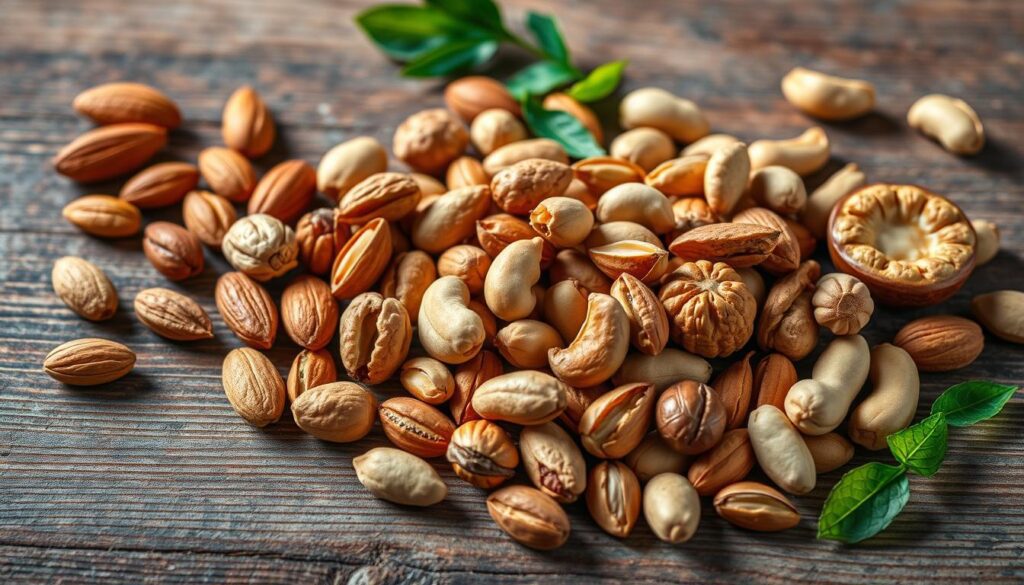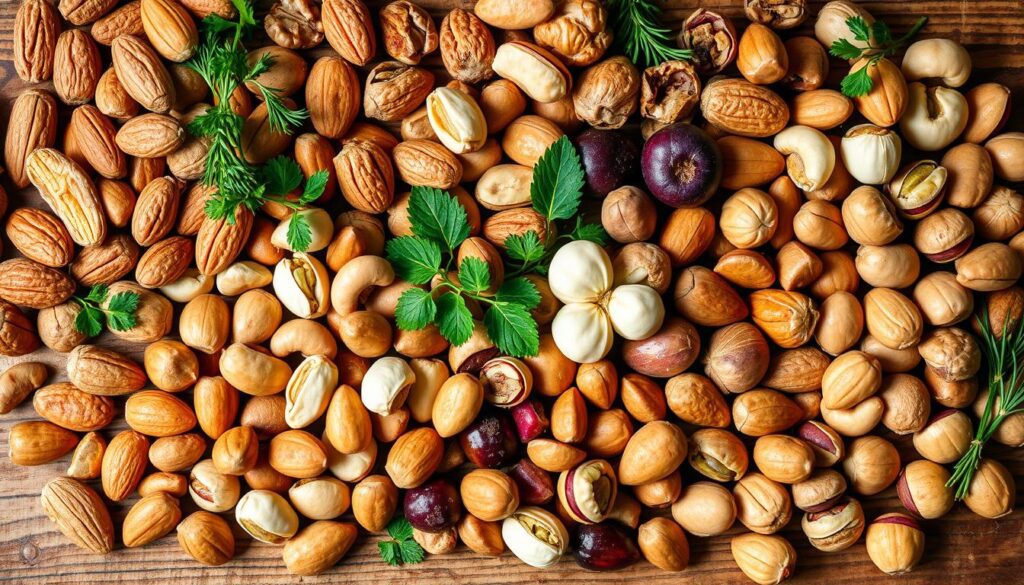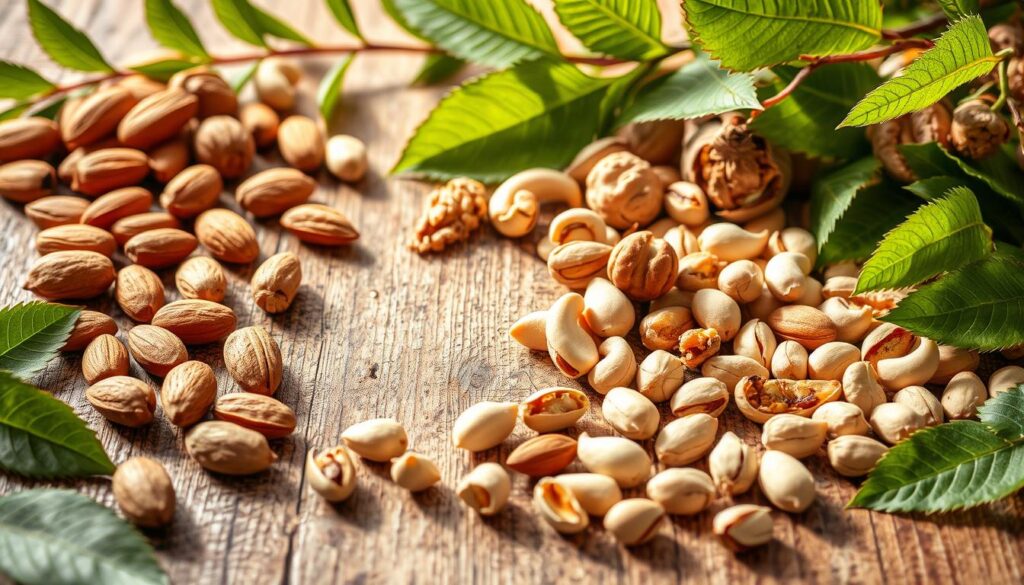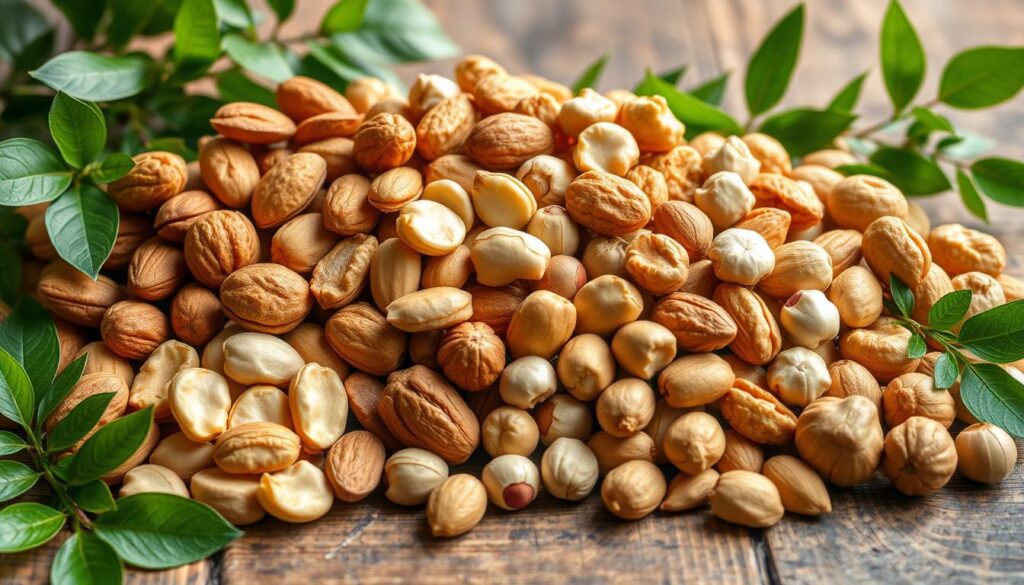Discover Nutritious Nuts: Uncover Their Amazing Health Benefits
Did you know that incorporating just a handful of nuts into your daily diet can reduce the risk of heart disease by up to 30%? Nuts aren’t just a tasty and convenient snack; they are packed with nutritional treasures. Research highlights that different types of nuts and their amazing health benefits can significantly contribute to overall well-being. They boast high levels of fiber, healthy fats, protein, vitamins, and minerals, making them an ideal choice for nutritious snacks. Not only do nuts enhance heart health, but they also support cognitive function and immune response.
With their diverse flavors and textures, nuts can transform meals and snacks alike, adding both taste and healthful nutrients to our diets. Join us as we delve deeper into the various types of nuts, their unparalleled health benefits, and creative ways to include them in your everyday nutrition.
Key Takeaways
- Incorporating nuts can lower heart disease risk by up to 30%.
- Nuts provide essential nutrients including fiber, protein, and healthy fats.
- They are versatile and can be easily integrated into meals or snacks.
- Various nuts have specific health benefits, such as brain boosting and weight management.
- Nuts are an excellent source of micronutrients needed for optimal health.
Introduction to Nuts and Their Nutritional Value
Nuts are an exceptional addition to any diet, offering a unique blend of flavors and a rich array of nutrients. Understanding the nutritional value of nuts reveals why they deserve a place in our meals. Packed with essential nutrients and healthy fats, nuts contribute significantly to overall health and well-being.
Overview of Nutritional Components
Various nuts provide distinct nutritional benefits. For instance, almonds, cashews, and pistachios are notable sources of protein, while chestnuts fall behind in this regard. The protein content in nuts can vary due to factors such as geographic origin and processing methods. Despite being classified as incomplete proteins compared to animal sources, nut proteins are linked to cardiovascular health benefits.
Nuts are rich in vitamins and minerals essential to human health. Walnuts, almonds, pine nuts, and hazelnuts stand out for their vitamin E content. B vitamins are abundant in almonds, cashews, pistachios, walnuts, and peanuts. Notably, chestnuts boast the highest vitamin C levels among nuts analyzed and also contain substantial folic acid concentrations.
The Role of Nuts in a Balanced Diet
A balanced diet benefits from incorporating nuts due to their health benefits. High in fiber and healthy fats, nuts can help manage weight and reduce the risk of heart disease. Research shows that consuming more than five servings per week might lower heart disease risk by up to 17%, particularly for individuals with type 2 diabetes. Regular nut consumption correlates with lower LDL cholesterol levels and triglyceride counts, contributing further to heart health.

Incorporating a variety of nuts in your diet not only enhances nutrient intake but also promotes overall health. Raw nuts are often the best choice, providing optimal benefits without added sodium or additives, and they are widely accessible. Thus, regular consumption of nuts is a delicious and effective way to support a balanced diet and enjoy their broad range of health benefits.
Different Types of Nuts and Their Amazing Health Benefits
Various nuts offer a wealth of nutrients, making them vital components of a healthy diet. Each type brings unique health benefits while enriching meals with flavor and texture. Below are some of the most popular nuts and their notable advantages.
Almonds: A Powerhouse of Nutrients
Almonds stand out with high levels of vitamin E and fiber. Their consumption can support both heart and gut health, potentially reducing levels of LDL cholesterol and promoting beneficial gut bacteria. With a recommended serving of just 30g containing 184 calories and 6.7g of fat, they provide a nutritious option for a snack or meal addition.
Pistachios: The Heart-Friendly Nut
Pistachios are low in calories but rich in antioxidants and potassium. They may improve blood pressure levels and aid in weight management. Each 30g serving contains 169 calories and 13.6g of fat, making them a smart choice for those looking to enhance their diet without excessive calories.
Walnuts: Omega-3 Rich and Brain-Boosting
Walnuts are renowned for their high ALA omega-3 fatty acid content. Regular consumption can boost heart health and promote brain function, potentially lowering risks associated with dementia. A standard 30g serving yields 206 calories and 20.6g of fat, proving to be a beneficial addition to one’s nutritional intake.
Cashews: Creamy and Beneficial
Cashews offer a creamy texture along with essential vitamins that support bone health. Their ability to improve blood pressure levels adds to their appeal, especially when consumed in moderation. A 30g portion contains 172 calories and 14.5g of fat, presenting a delicious and beneficial choice for snacking.
Pecans: Nutrient-Dense and Delicious
Pecans are packed with healthy fats, zinc, and antioxidants. Research suggests they can help lower harmful cholesterol levels. With a recommended serving size of 30g comprising 207 calories and 21g of fat, pecans are not only flavorful but also advantageous for heart health.
Macadamia Nuts: The Low-Carb Choice
Macadamia nuts are celebrated for their low carbohydrate content and healthy fat profile, making them an excellent option for those following a keto diet. They contribute to improved cholesterol levels and overall heart health. A serving of 30g generally includes around 204 calories and 21g of fat.
Brazil Nuts: Selenium Superstars
Brazil nuts are exceptional in their selenium content, supporting thyroid function and offering powerful antioxidant properties. A small serving of 30g packs about 205 calories and 20.5g of fat, delivering remarkable health benefits with just a few nuts.
Hazelnuts: Antioxidant-Rich Delights
Hazelnuts are rich in monounsaturated fats and vitamin E, contributing positively to cardiovascular health. Their antioxidant content may help lower elevated cholesterol levels. A 30g serving contains 195 calories and 19.1g of fat, making them a tasty and health-oriented choice.

Health Benefits of Incorporating Nuts into Your Diet
Nuts offer a plethora of health benefits when integrated into daily meals, making them a staple for nutritious eating. These nutrient-dense snacks support various aspects of well-being, enhancing heart health, aiding weight management, and improving cognitive functions.
Support for Heart Health
Nuts contribute significantly to heart health, helping to lower cholesterol levels and reduce blood pressure. Regular consumption of nuts, such as walnuts and almonds, can decrease the risk of heart disease by as much as 50% for those who enjoy about five ounces weekly. Nutrients found in nuts, like polyunsaturated fats and antioxidants, not only support cardiovascular function but also help in decreasing inflammatory markers, which is particularly beneficial for those with chronic conditions.
Benefits for Weight Management
Weight management can be effectively supported by the inclusion of nuts in the diet. Despite being calorie-dense, nuts are high in fiber and protein, promoting feelings of fullness and effectively controlling hunger. Basing meals around a handful of mixed nuts can make a notable difference in reducing calorie absorption. Studies have linked nut consumption with lower rates of weight gain, highlighting their role in metabolic health.
Enhancing Cognitive Functions
Including walnuts in one’s diet has shown potential in enhancing cognitive functions. Rich in omega-3 fatty acids, walnuts aid in brain health, potentially lowering the risk of cognitive decline and neurodegenerative diseases. Other varieties like almonds are beneficial for blood sugar regulation, further supporting brain health for individuals with specific dietary needs.

Culinary Uses of Nuts in Everyday Meals
Nuts serve as versatile ingredients in numerous dishes, enhancing both flavor and nutritional value. Chefs and home cooks alike appreciate the culinary uses of nuts, from salads to desserts. Their ability to complement various meals makes them a popular choice for healthy snacks as well. Incorporating nuts into your diet can provide a delightful crunch while reaping their health benefits.
Incorporating Nuts into Snacks and Meals
Nuts can easily be added to several snacks and meals. For instance, adding chopped almonds to yogurt provides a protein boost and enhances texture. Peanuts or cashews can elevate stir-fries, while pecans can transform a standard salad into a nutritious feast. Mixing nuts and dried fruits like raisins creates a delightful and satisfying healthy snack that promotes energy without the need for processed options.
Creative Recipes Featuring Nuts
Exploring nut-based recipes opens a world of culinary possibilities. Consider preparing a rich walnut pesto as a sauce for pasta or dipping vegetables. Almond flour can be used as a gluten-free substitute in baking, leading to light and airy desserts. For a refreshing snack, try making homemade energy balls with dates, cocoa powder, and a variety of nuts. The robust flavors and textures added by nuts not only enhance the dishes but also contribute to a balanced diet.
Potential Downsides and Considerations When Eating Nuts
Incorporating nuts into the diet can offer numerous health benefits, yet awareness of potential downsides remains essential. One significant concern is nut allergies, which affect a considerable portion of the population and can lead to severe reactions. Individuals with nut allergies must exercise caution, avoiding all types of nuts or seeking guidance from healthcare professionals for safe dietary practices.
Allergies and Sensitivities
Nut allergies pose serious health risks, making it imperative for those affected to be vigilant. Symptoms can range from mild hives to life-threatening anaphylaxis. Understanding the differences among nut types helps individuals avoid exposure and manage their diets effectively. Cross-contamination during food preparation also presents risks, necessitating clear communication about nut ingredients in meals.
Caloric Density and Serving Sizes
Nuts are recognized for their health benefits; however, they also possess high caloric density. To maintain a balanced diet, it is crucial to monitor serving sizes of nuts carefully. Recommended daily intake typically ranges from one to two ounces, allowing individuals to enjoy the nutritional advantages without excessive calorie consumption. Choosing 100- to 200-calorie nut packs can facilitate controlled snacking, preventing overindulgence.
Conclusion
Incorporating nuts into your diet can lead to remarkable health benefits, ranging from enhanced heart health to better weight management and cognitive function. Numerous studies indicate that frequent nut consumption is associated with a significant reduction in the risk of coronary heart disease and even nonfatal myocardial infarction. For instance, those who consume nuts five times a week experience a remarkable 51% decrease in nonfatal heart incidents. Such statistics underscore the vital role of nuts as a nutritious component of a balanced diet.
Despite potential concerns related to allergies and caloric density, the overwhelming nutritional advantages of nuts cannot be overlooked. They not only contribute to lower cholesterol levels but also help maintain a healthy body weight, meaning that even as you enjoy these delicious snacks, you may be positively impacting your overall wellness. By making smarter choices and opting for nutritious versions of snacks that include a variety of nuts, you can easily enhance your meals and snacks while prioritizing your health.
Ultimately, understanding how to effectively incorporate nuts into your diet empowers individuals to make informed decisions that promote better health. As you explore versatile culinary uses for these nutrient-packed foods, you can confidently add a delicious crunch to your favorite dishes while reaping the numerous health benefits of nuts.





